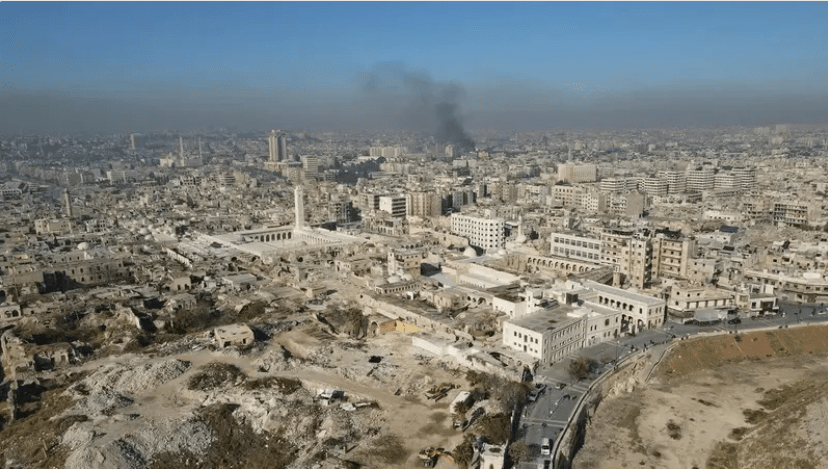Syria’s battlefield re-emerges as Lebanon’s does. Why is the Aleppo front being opened by Turkey now?

Syrian opposition group Hay’at Tahrir al-Sham (HTS) and armed factions supported by Turkey launched a surprise offensive in northwestern Syria, making significant advances toward Aleppo – the country’s second-largest city. This development marks the first frontline shift dividing Syria’s “three mini-states” in nearly five years and comes after an Israeli warning to Syrian President Bashar al-Assad.
The HTS-led offensive in western Aleppo directly targeted Iranian-backed militias and killed a senior Iranian Revolutionary Guard. Earlier this month, Israel carried out airstrikes on Idlib for the first time, targeting Iranian and Hezbollah positions.
In a briefing Wednesday, a senior Israeli military official said that the Israeli army would not just strike the weapon shipments, but al-Assad’s regime would pay for aiding Hezbollah.
“We struck on Syrian soil all attempts to transfer weapons to Hezbollah. If we detect intentions to transfer weapons to the organization – we will act,” Israeli army spokesman Daniel Hagari said.
Syria’s three fiefdoms
After the anti-government Syrian uprising began in 2011, the country quickly descended into a nearly decade-long civil war, which divided the country into zones of influence. A series of accords were clinched by major players, including the US, Turkey and Russia, to define territorial lines east of the Euphrates, spanning 185,000 square kilometers.
In March 2020, Erdogan and Russian President Vladimir Putin agreed to partition three zones of influence in a bid to stabilize the shaky ceasefire in Idlib – the jihadist bastion in northwest Syria where HTS was sequestered.
The first zone – encompassing approximately 65 percent of the country – is under government control, supported by Russia and Iran. The second zone, covering around 25 percent, is dominated by the Syrian Democratic Forces (SDF), with backing from the US-led international coalition. The third zone lies in northern and northwestern Syria, where Hay’at Tahrir al-Sham (HTS) and factions allied with Turkey hold sway. Although skirmishes and airstrikes occurred, contact lines between these areas had remained largely unchanged.
Turkey’s response
For his part, Turkish President Recep Tayyip Erdogan looks to be exploiting the weakened positions of Iran and Hezbollah in Syria, alongside Russia’s distraction with the war in Ukraine, to establish new dynamics on the ground – similar to his strategic moves in Nagorno-Karabakh and Libya. Turkey’s foreign ministry said the operation named “Countering Aggression” was a response to a series of recent government attacks on Idlib in violation of de-escalation agreements. Ankara plays a pivotal role in northern Syria, providing military and intelligence support to Syrian factions and Hay’at Tahrir al-Sham (HTS). Turkish soldiers, military outposts, and infrastructure are firmly embedded in the region.
The surprise attack looks to be aimed at pressuring Syrian President Bashar al-Assad, who has refused to meet the Turkish president unless his forces withdraw from Syrian territory. Erdogan could also be looking to encircle the Syrian Democratic Forces (SDF) – mostly comprised of Syrian Kurds from the YPG – to strengthen his bargaining position ahead of Trump’s return to the US presidency. This strategy mirrors Turkey’s previous interventions in support of Libya’s Tripoli-based government and Azerbaijan in Nagorno-Karabakh.
In 2016, Erdogan reached an agreement with Putin that allowed Syrian government forces to reclaim eastern Aleppo in exchange for Turkey dismantling an autonomous Kurdish entity in northern Syria. Since then, Aleppo has remained under government control.
Russia’s response
For its part, Moscow has condemned the HTS operation on Aleppo, calling it “a violation of Syria’s sovereignty,” and reiterated its support for the Syrian government’s efforts to restore order in the region. But interestingly enough, it has yet to launch airstrikes on Idlib in response.
This could be interpreted in two ways: Putin could be trying to pressure al-Assad to meet with Erdoğan, or he is simply too preoccupied with the war in Ukraine, where he has redeployed many Wagner regiments. However, Russian airstrikes are expected to begin today.
Iran’s response
For his part, Iranian Foreign Minister Abbas Araghchi reaffirmed Tehran’s steadfast support for Syria’s government, people, and army in their fight against terrorism in a phone call with his Syrian counterpart, Foreign Minister Bassam al-Sabbagh. Araghchi characterized recent developments in Syria as an “American-Zionist scheme to destabilize the region following Israel’s failures against the resistance.”
The assault on Aleppo coincides with signs that al-Assad could be beginning to distance himself from Iran. Amid Israel’s war on Gaza and subsequent war on Hezbollah in Lebanon, the Syrian president has remained conspicuously silent.
Meanwhile, reports indicate that Iranian and Iraqi factions are preparing to mobilize forces toward Aleppo to counter the attack. Tehran appears poised to leverage this battle to strengthen its military presence in Syria.
Damascus’s response
Syrian government forces have dispatched reinforcements, reportedly numbering around 50,000 troops, to Aleppo. A large-scale counteroffensive, backed by Russian air support, looks to be in the works to reclaim Aleppo. But Damascus was clearly caught off-guard. Rami Abdulrahman, the director of the Syrian Observatory for Human Rights, explained the setbacks could be a result of an overreliance on Hezbollah, which has been preoccupied with fighting Israel in southern Lebanon in the past few months.
SDF’s response
Although the SDF leadership has yet to react to the recent assault, they maintain their adversarial stance toward the Turkish-backed Hay’at Tahrir al-Sham (HTS). The factions have encircled SDF-held areas in Aleppo’s countryside, raising concerns that Turkey could launch fresh military operations east of the Euphrates.
The timing – just ahead of Trump’s return to the White House – worries the SDF. The group recalls his 2019 decision to withdraw some American forces from their areas, which facilitated advances by Turkish-backed forces, and they worry this could be repeated.






